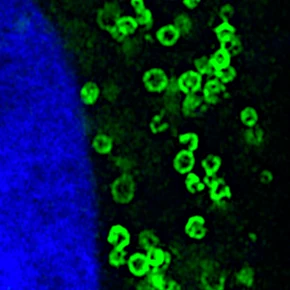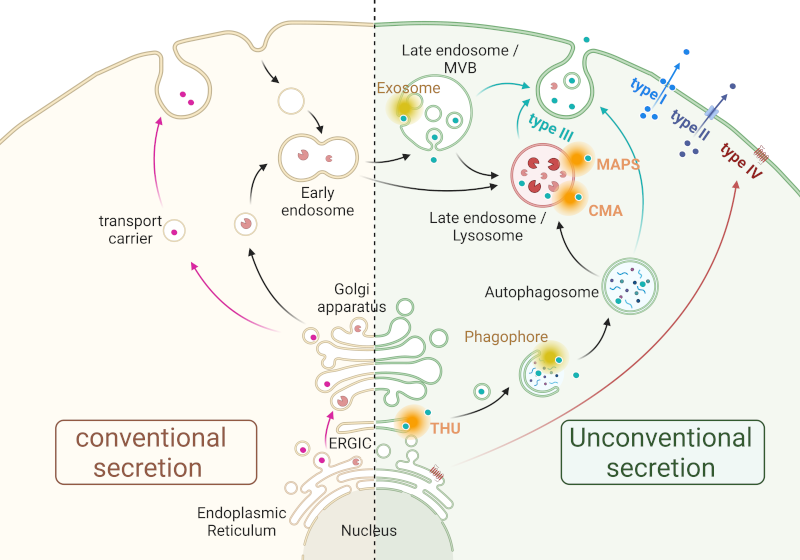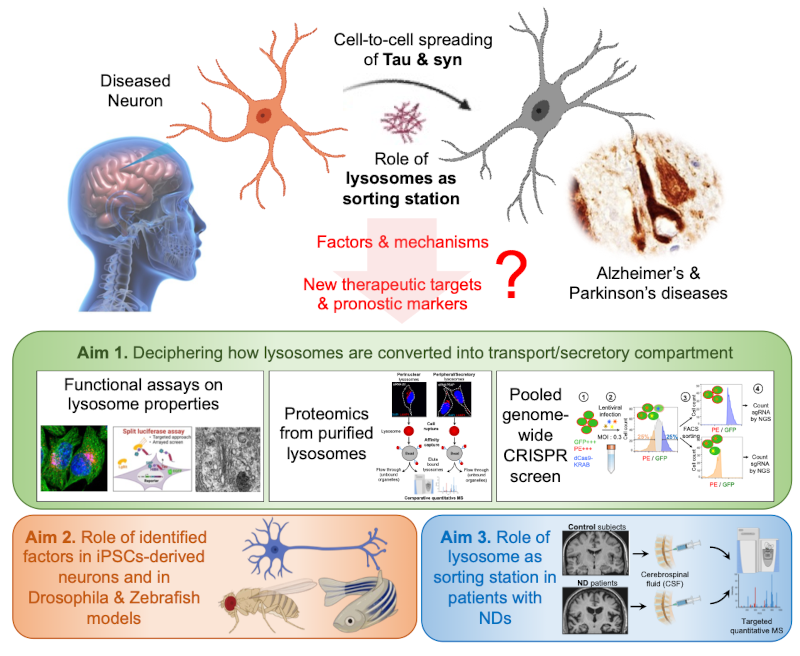Team Philippe MARIN
Neuroproteomics and signalling of brain disorders
Project Protein trafficking and neurodegenerative diseases
PRINCIPAL INVESTIGATOR

IGF staff involved
Marie-Laure PARMENTIER
DR2, Inserm
Sylvie CLAEYSEN
CRHC, Inserm
Philippe MARIN
DR1, CNRS
Aurore FILAQUIER
Thèse, UM
Éloïse NEEL
Doctorante CNRS
Morgane DENUS
IE, CDD CNRS

Accumulation of toxic aggregate proteins such as Tau and alpha-synuclein (a-Syn) is a common pathological hallmark of neurodegenerative diseases (NDs), including Alzheimer’s (AD) and Parkinson’s diseases (PD). Until recently, it was thought that Tau and Syn accumulation occurs in a cell-autonomous manner. However, compelling evidence now suggests that they disseminate in a prion-like manner through their release from cells via unconventional protein secretion (UPS), i.e., independently of the endoplasmic reticulum-Golgi secretory pathway.

We previously demonstrated that lysosomes can play a critical role as sorting station for UPS and more specifically in the propagation of Tau and a–Syn through lysosomal exocytosis. This led us to hypothesize that, in response to proteotoxic stress, lysosomes can be remodeled and/or re-routed for transport and secretion. Indeed, in addition to their degradative function, lysosomes are highly dynamic structures with multiples biological properties, able to fuse with the plasma membrane after transport along the microtubules. Supporting this hypothesis, new evidence has associated the onset and development of several NDs with defects in lysosomal degradative properties. In this context, a critical challenge now is to understand how lysosomes are diverted from degradative function and acquire secretory/transport carrier functions promoting Tau and Syn dissemination, and whether the mechanistic understanding of these processes could lay the foundation for new therapeutic and diagnostic strategies for NDs.
In the present project, we develop multidisciplinary and translational approaches to investigate the role of lysosomes in neurodegenerative diseases where the accumulation of protein aggregates is a known factor. More specifically, our project aims to:
1- Uncovering molecular players dynamically activated or recruited on lysosomes to divert these organelles into propagating stations, and identifying factors involved at every step of Tau and Syn trafficking. Toward this objective, we will employ innovative cell-based assay using the split luciferase technology and the RUSH system, and tools recently developed including state-of-the-art functional assays on lysosomal properties, an innovative platform for pooled genome-wide CRISPR screen for protein trafficking and secretion, and proteomics from purified lysosomes.
2- Investigating the role of identified factors in neurons derived from healthy subject and AD/PD patient induced pluripotent stem cells, as well as in new Drosophila and Zebrafish models to monitor specifically Tau and a–Syn spreading in vivo. This will validate their pathophysiological relevance and reveal their therapeutic potential.
3- Assessing the relevance of lysosomes as main sorting station for Tau and a–Syn in patients with NDs by quantifying the amounts of lysosomal enzymes/factors from cerebrospinal fluid samples using targeted mass spectrometry. In addition to confirming our working model using clinical samples, this might reveal new biomarkers for NDs.
At the crossroad of critical challenges, we believe that this project can shed light on fundamental mechanisms governing lysosome biology, and have potential strong impacts in biomedical research with promising perspectives to develop innovative therapeutic and diagnostic strategies for ND management.

Main publications
• Filaquier A., et al. (2022) Curr Opin Cell Biol, 16;75:102072.
• Stamatakou E., et al. (2020) Cell Discovery, 10.1038/s41421-020-0158-y
• Bassaganyas L., et al. (2019) J Cell Biol, 11:3861-3879.
• Villeneuve J., et al. (2018) J Cell Biol, 2:649-665.
• Villeneuve J., et al. (2017) Mol Biol Cell, 1;28(1) :141-151
• Villeneuve J., et al. (2013) Embo J, 1:72-85.
Funding
• 2024-2027 Fondation pour la Recherche Médicale (FRM) – Partenaire
• 2023-2027 ANR 2023 UnProSec – Coordinateur
• 2023-2025 Fondation pour la Recherche sur le Cerveau (FRC) – Coordinateur
• 2023-2025 Association France Alzheimer – Investigateur Principal
• 2022-2024 Fondation Vaincre Alzheimer – Investigateur Principal
• 2021-2023 Association France Parkinson – Investigateur Principal
Collaborations
• Yoan Arribat (IRMB, Montpellier)
• Laia Bassaganyas (IGF, Montpellier)
• Ana Boulanger (IGH, Montpellier)
• Carole Crozet (INM, Montpellier)
• Sylvain Lehmann (CHU, Montpellier)
• Mireille Rossel (MMDN, Montpellier)
• Chiara Zurzolo (Pasteur, Paris)
Alumni
• William Fargues (Master & Engineer, 2023-2024)
• Adrià Martinez (Master, 2023)
• Amélie Vidal (Master, 2023)
• Lola ARGENSON (Master, 2022)
• Ariane BROWER (Master, 2022)
• Elisa GARBAYE (Master, 2022)


